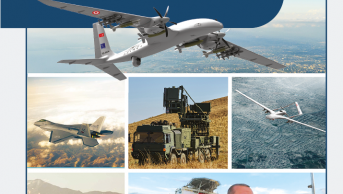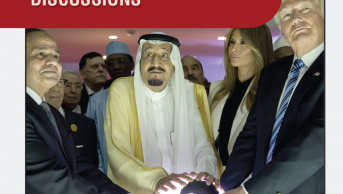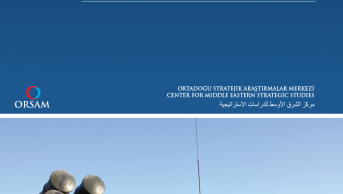It Is Not Enough to Defeat ISIS Militarily

The terrorist organization ISIS has emerged in Iraq and Syria with the influence of both internal and external problems and has been trying to maintain its presence by producing propaganda aimed at ensuring its legitimacy by addressing these problems. However, the references of ISIS while trying to gain legitimacy for their actions and statements are not limited to Iraq and Syria. Especially the rise of xenophobia and Islamophobic acts and discourses in Western countries are among the important reference sources of ISIS.
ISIS, different from other terrorist organizations, has declared its so-called caliphate by controlling a very wide geographical area in a short time with the influence of hybrid strategies that they apply both in the military field and communication technologies. However, ISIS, has recently been suffering serious loss of power and gets stuck in the corner every passing dayas a result of airstrikes carried out by anti-ISIS coalition, offensive to liberate Mosul initiated by the Iraqi army, and the Operation Euphrates Shield which can be regarded as the most strategic moves.
As a result of the military fight against ISIS in the Middle East, it is observed that ISIS has severely lost its territory. The loss of land of the terrorist organization has reached 62% in Iraq and 30% in Syria. Along with the loss of land, there are also severe loss of propaganda power and militants. This loss of territory refers to thededuction on the income that ISIS obtains through its controlled territories and the dissolving of the human source that it holds together enforcedly and voluntarily at the beginning. Apart from this, with the decrease of the controlled areas, it is also seen that the ISIS lands have contracted towards Raqqa diverging from the border lines. The contraction of the territories controlled by ISIS day by day shows that the end for the so-called caliphate is approaching.
The terrorist organization is not only losing the lands it controls. As indicated by Charlie Winter's work; along with other reductions, the propaganda of the terrorist organization has also been in decline. However, it should be noted that the only thing approaching to the end in terms of ISIS at this stage is only a physical presence and influence. Nevertheless, the online power of the organization that cannot be ignored.
So-Called Caliphate Should Be Neutralized in Cyber World
While the likelihood of ISIS being defeated in the field increases day by day, it is necessary for the post-ISIS period to be able to provide a positive atmosphere to the international arena. The propaganda that crosses the so-called caliphate lands and reach different parts of the world in different languages with the channels that the terrorist organization builds on the Internet creates serious threats in terms of sleeper cells and new militant recruitment processes. At this point, it is only just to remember the member of the terrorist organization Al-Qaeda Anwar al-Awlaki killed in 2011. Despite being killed in 2011, the thoughts of Awlaki are being watched on various social media channels on the internet and continue to speed up the radicalization processes of individuals. Even if the contents belong to Awlaki are disabled to the online access, they will still be in global circulation offline as the data transfer is easier.
Conflict geographies, especially emerged with the collapse or failure of the state apparatus in different countries in the Middle East, and are seen as unique attractions in terms of mobilizing their Foreign Terrorist Fighters(FTFs).
For terrorist organizations, Internet provides a better the safe haven situation than the unsuccessful states do. Especially the youngsters including masses of different age range create a great majority on the Internet and have more time plays a facilitating role for people like Awlaki to convey their messages. Therefore, even if ISIS is defeated militarily, it will not be hard to propagate, recruit militant and launch a new mobilization process via new media outlets that are available on the Internet and are likely to be published.
Foreign Terrorist Fighter
So, is it necessary for the international public to be hopeful of the military defeat that ISIS is starting to have on the field, due to the power loss they have faced?
The terrorist organization constitutes its actual strength by the terrorists called FTF whose threat level is quite high, gathered by means of propaganda strategies carried out over the Internet and in itself who obtain military experience in the field and then return to their country. While these terrorists formerly called as Foreign Fighter with the 2178 numbered United Nations Security Council Resolution (UNSCR) they have started being called as Foreign Terrorist Fighter (FTF). The level of threat that FTF created in many conflicts in different regions of the world both for their countries and regions they have gone for fighting is quite high. In the UNSCR 2178of 24 September 2014, FTF is described as:
“Individuals who travel to a State other than their State of residence or nationality for the purpose of the perpetration, planning or preparation of, or participation in, terrorist acts or the providing or receiving of terrorist training, including in connection with armed conflict”
Foreign fighters who have participated in the conflicts in different regions of the world for many years have become a security issue spreading over a very wide geography with the gradual failure of the Arab Spring. So, about 40,000 FTFs from more than 115 countries with different intentions left their countries to join ISIS and fight under the roof of the so-called caliphate. Conflict geographies emerging in particular in the Middle East with the collapse or failure of the state apparatus in different countries, are regarded as unique attractions in terms of mobility of FTFs. Because this kind of war geographies provide great opportunities forFTFs in terms of the military training they need.
After gaining military experience in the field of combat, FTFs who came back and carried out attacks in their own country or in a different country emerged as a crucial threat in terms of international security. Many attacks have been carried out in western countries such as notably Turkey, Belgium and France. Hundreds of people have lost their lives in the attacks carried out by FTFs while thousands of people have been wounded.
The actions that FTFs have carried out up to now reveal that a more rigorous work should be carried out for the post-ISIS process. However, problems in both the struggle field and the Western countries also signal that international security may face greater threats in the post-ISIS period. The crisis of confidence in the international system and the struggles for influence in different regions; Islamophobic, extreme-right and racist discourses and actions in Europe are already feeding into ISIS’ discourse. It should not be forgotten that there is not enough intelligence sharing among the countries in the international system where crisis of confidence is persistent.
The political and socio-cultural problems the Muslims faced in the West, especially in Europe, are also regarded as causing a major identity crisis in this region. Such crisis causes the aforementioned target groups who are targets of the propaganda strategies of ISIS to be aimed at as a source of future militants. Such problems need to be addressed together with the FTFs who already returned to Europe and will return to Europe in the post-ISIS period. Otherwise it is obvious that the FTFs who gained experience in the battlefield will not have difficulty in recruiting new militants and to make them ready for attacks without going to the battlefield, by training them in the geographies they live in.
As a conclusion, the military struggle carried out against ISIS in the field should not be regarded as a victory with the possible defeat of ISIS. States should act jointly with both existing FTFs and new FTFs who will return in the post-ISIS period, regarding both intelligence sharing and the integration of those who will return. Above all, ignoring extreme right, racist and Islamophobic discourses and actions in Western societies, especially in Europe, seems to be serving to the success of ISIS propaganda.









